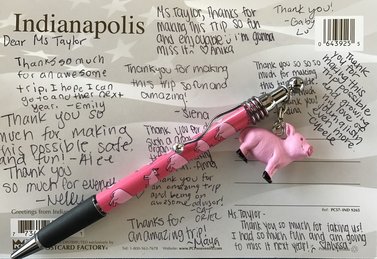 My publications students gave me this postcard after we attended the fall National High School Journalism Convention in Indianapolis. Conventions like this bring students who are already engaged in journalism together, but how can we get the rest of the school excited? My publications students gave me this postcard after we attended the fall National High School Journalism Convention in Indianapolis. Conventions like this bring students who are already engaged in journalism together, but how can we get the rest of the school excited? I wish journalism was a required core subject. I wish we could help every high school student dive into the process and joy of determining what is newsworthy, learning what constitutes good reporting versus repeating rumors, developing the confidence to interview adults and peers and ask hard questions, considering the foundational pillars of ethical journalism, writing and editing and editing and editing and proofreading until an article is truly clear, and learning all the other skills and ways of thinking that happen naturally when a student is actively engaged in news-production. Since every student at the school can't be on staff, however, how can we get the rest of the school engaged in news? I've been thinking about this in the wake of the Seattle JEA/NSPA National High School Journalism Convention, inspiring as always. Being surrounded by engaged, excited young journalists makes me want to clone their experience and instill it in all students.
In a 2002 article for Poynter, Bob Steele explores definitions and ethics of "civic journalism," journalism that serves the public by revealing issues and offering solutions alongside problems. His essay primarily explores how journalists can walk the line between being impartial observers and experts who can empower the public to solve problems. "Therein lies a major question about the role of the public journalist," Steele writes. "Is she merely a conscientious citizen, or is there something in the role of the journalist that distinguishes her from other citizens? Is the newspaper merely a recorder and reporter of events or is it a catalyst to change?" The concept of civic journalism has many critics — important concerns about journalists becoming activists — but at the heart of this philosophy is the power of journalism that thinks first about what the public needs and wants — and how to make them want what they need. For Generation Z, socially conscious and technologically deft, this kind of civic journalism may be the key to engagement outside of journalism classrooms. In Chapter 8 of Elements of Journalism, Rosenstiel and Kovach discuss journalism as "a map for citizens to navigate society." If a cartographer leaves off an important country, the public is going to get lost. This, too, is a kind of civic journalism. When selecting and writing stories, journalists must be comprehensive in their coverage and cover events proportionally. Relevance creates engagement. I can't convince every student to take journalism, but I can work with my student journalists to make sure they are always thinking about what their public needs and wants and help them to get their peers engaged in important conversations. I've also thought about how we can better talk about what it means to experience the world from a journalistic mindset. My students tell me that they see the world and hear professional news very differently because of their experiences working on the paper, and I want them to think about how they can bring that experience to their peers. Next year, we plan to set up a "Meet the Press" panel to talk about topics like journalistic ethics and social role. Their peers know we have a paper, but do they know what goes into it? Perhaps drawing back the curtain will help them to see why it matters so much. Additionally, I've been thinking about citizen journalism, which journalist Tony Rogers puts into two categories: independent (done completely autonomously) and semi-independent (contributing to existing professional news sites). We've always been wary of inviting students at the school to write for the paper without proper training. With some basic guidance and oversight from student editors, though, I think this is another key to bringing more students into the fold and getting them excited to read and share the paper. For those of you who advise student journalism, what have your staffs done to get their peers engaged in news that matters? How can we get everyone else to care? I'd love to continue this conversation.
0 Comments
Leave a Reply. |
About“And though she be but little, she is fierce!” -A Midsummer Night’s Dream Archives
December 2020
Categories
All
|

 RSS Feed
RSS Feed